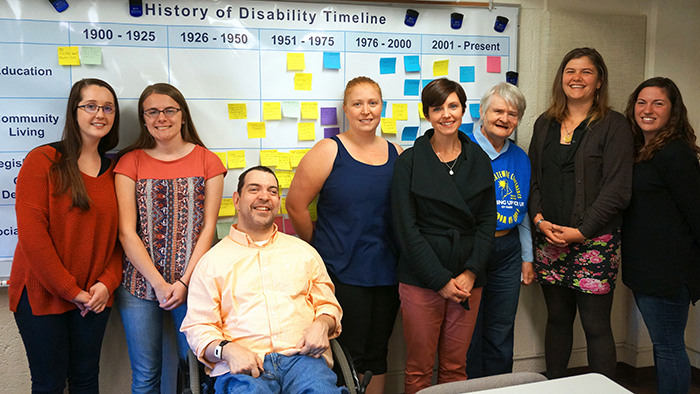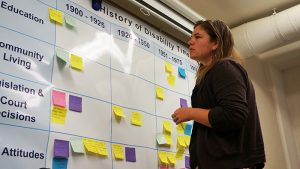
CAC Members Share Lived History of Disability with NH-ME LEND Trainees
 As part of a Leadership Intensive on the history of disability, two members of the University of Maine Center for Community Inclusion and Disability Studies’ Community Advisory Committee (CAC) recently shared their lived history of disability with UMaine trainees and faculty in the New Hampshire-Maine Leadership Education in Neurodevelopmental and Related Disabilities (NH-ME LEND) Program.
As part of a Leadership Intensive on the history of disability, two members of the University of Maine Center for Community Inclusion and Disability Studies’ Community Advisory Committee (CAC) recently shared their lived history of disability with UMaine trainees and faculty in the New Hampshire-Maine Leadership Education in Neurodevelopmental and Related Disabilities (NH-ME LEND) Program.

In lieu of the weekly two-state LEND seminar, trainees and faculty in NH and ME simultaneously, but separately, explored the trajectory of the disability movement in their respective states and nationally. A central exercise of the Intensive was to construct a historical timeline on developmental disabilities from 1900 to the present and to note how parallel developments in education, community living, legislation and social attitudes intersected with and impacted the disability timeline. Maine trainees and faculty also discussed the closing of Pineland, Maine’s former state institution for people with developmental disabilities.
A generation apart, Community Advisory Committee members Avery Olmstead and Maryann Preble candidly shared their experiences of living with a disability. Avery, an Old Town resident with a graduate degree and cerebral palsy, spoke of parents who refused to institutionalize him and a mother who fought and sacrificed for his inclusion in public education in every location his military father was stationed. Maryann, a former resident of Pineland, went on to marry and now lives independently in the Augusta area.
Top photo caption: (Back row standing, left to right): LEND trainees Holly Hegarty, Taylor Harris, Olivia Shaw, Jodie Hall; guest speaker Maryann Preble; trainees Emily Hill and Madeline Ruffin. (Front row): Guest speaker, Avery Olmstead.
